 Indra Sabha, Ellora Caves | |
| Regions with significant populations | |
|---|---|
Maharashtra | |
| Languages | |
| Marathi | |
| Religion | |
| Jainism |
| Part of a series on |
| Jainism |
|---|
 |
Jainism has been present in Maharashtra since ancient times. The famous Ellora Caves demonstrate that Jainism was part of a thriving religious culture in Maharashtra in premodern times.
History

Jainism in Maharashtra has a long history. The oldest inscription in Maharashtra is a 2nd-century BC Jain inscription in a cave near Pale village in the Pune District. It was written in the Jain Prakrit and includes the Navkar Mantra. The first Marathi inscription known is at Shravanabelagola, Karnataka near the left foot of the statue of Bahubali, dated 981 CE.
Jainism in Maharashtra was patronised by many rulers such kings from the Shilaharas. Many of forts were built by kings from these dynasties and thus Jain temples or their remains are found in them. Texts such as the Shankardigvijaya and Shivlilamruta suggest that a large number of Marathi people followed jainism in the ancient period.
Jain communities in present day Maharashtra


There are many native jain communities in present day Maharashtra. The communities tend to be endogamous, and generally do not intermarry with the Jains who have arrived from North India. They belong to the Digambar sect. The four largest communities by numbers are:
- Saitwal, originally Tailors and Cloth Merchants
- Chaturtha, originally agriculturists, now engaged in various professions
- Panchama, various professions
- Kasar, traditionally coppersmiths
Each of the above communities are affiliated to their own Matha and led by the Matha leader called Bhattaraka. In addition to the above four, there are several smaller native Maharashtrian Jain communities.
- Upajjhaya
- Kamboja[1][2]
- Harada
- Jabade, Jain community in Maharashtra
- Dhakad A small Jain community found primarily in Western Vidarbha districts of Akola, Yavatmal, Washim and Amravati.
Jains from other regions have a large population in Maharashtra. Majority of them are from Rajasthan and Gujarat. Some of them are from Madhya Pradesh and Uttar Pradesh. Some of these communities have been in Maharashtra for centuries, and are now indistinguishable from the native residents of Maharashtra. They are divided in following large groups:
Religious organizations
The Dakshin Bharat Jain Sabha is a religious and social service organization of the Jains of South India. The organization is headquartered at Kolhapur, Maharashtra, India.[3] The association is credited with being one of the first Jain associations to start reform movements among the Jains in modern India.[4][5] The organization mainly seeks to represent the interests of the native Jains of Maharashtra (Marathi Jains) and Karnataka (Kannada Jains).
Jainism in Mumbai
Mumbai has one of the largest populations of Jains amongst all the cities in India. Mumbai also has numerous Jain temples.
Jain Tirthas and Temples
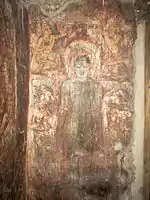
- Cave temple
- Main temple
- Shantinath Jain Teerth
- Gajpanth
- Kumbhoj
- Shantinath Jain Teerth
- Shantinath temple, Ramtek
- Jahaj Mandir, Mandwala[6]
- Jintur
- Godiji Parshwanath Temple, Mumbai
- Nemgiri in Parbhani district
- Katraj Tirth
- Babu Amichand Panalal Adishwarji Jain Temple, Walkeshwar
- Shri Antariksha Parshvanath
- Shree Vimalnath Bhagwan Tirth, Sakri
- Shirpurji teerth, Dhule district, Nashik
- Pashvanath Jain Temple, Nijampur Dhule
- Shri 1008 Mallinath Digamber Jain Atishaya Kshetra, Shirad Shahpur
- Shri vimalnatha swami Jain shwetambar temple in Bibwewadi
- Kachner Jain temple in Aurangabad, Maharashtra
- Paithan Jain Tirth
- Trimurti Digambar Jain Mandir in Sanjay Gandhi National Park, Borivali
- Shree Mahavir Jain Temple in Pimpri-Chinchwad near Pune
- Shri Digamber Jain Siddha Kshetra Kunthalgiri, Dist. Osmanabad, Maharashtra
Gallery
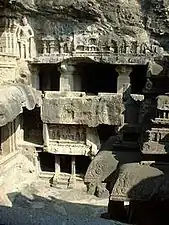 Jain cave in Ellora
Jain cave in Ellora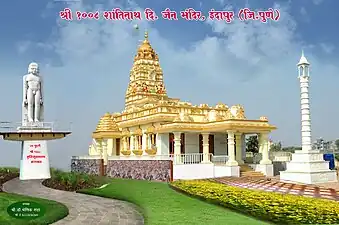
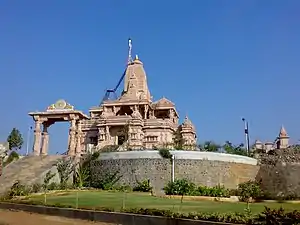 Shree Dharmachakra Prabhav Tirth at Gajpanth
Shree Dharmachakra Prabhav Tirth at Gajpanth
 Jain Pavapuri Jal Mandir in Katraj, Pune
Jain Pavapuri Jal Mandir in Katraj, Pune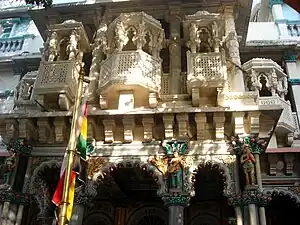 Walkeshwar Jain temple in Mumbai
Walkeshwar Jain temple in Mumbai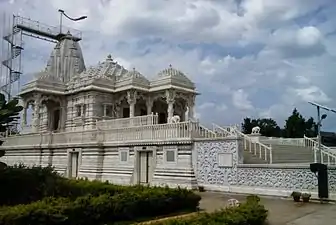 Dadabadi, Jalgaon
Dadabadi, Jalgaon Shri Godiji Parshwanth, Mumbai
Shri Godiji Parshwanth, Mumbai Idol of Lord Shri Parshvanath at Kachner
Idol of Lord Shri Parshvanath at Kachner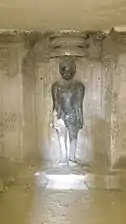 Lord Mahaveer at Dharashiv Caves
Lord Mahaveer at Dharashiv Caves
Notable Marathi Jains
- Walchand Hirachand
- Ajit Gulabchand
- Akshar Kothari
- V. Shantaram
- Sandhya Shantaram
- Kiran Shantaram
- Karmaveer Bhaurao Patil
- Bal Patil
- Suresh Jain
- Vaibhav Mangle
- Raju Shetti
- Vidyadhar Johrapurkar
- Nirmalkumar Phadkule
- Vilas Adinath Sangave
- Dhulappa Bhaurao Navale
- Kallapa Awade
- Rajendra Patil
- Justice Bhalchandra Vagyani
- Dhananjay Gunde
See also
References
- ↑ Bhanu, B. V. (2004). People of India: Maharashtra - Kumar Suresh Singh, Anthropological Survey of India - Google Boeken. Popular Prakashan. ISBN 9788179911013. Retrieved 24 April 2012.
- ↑ Hassan, Syed Siraj ul (1989). The Castes and Tribes of H.E.H. the Nizam's Dominions - Syed Siraj Ul Hassan - Google Boeken. ISBN 9788120604889. Retrieved 24 April 2012.
- ↑ Bhanu, B. V. (2004). People of India: Maharashtra - Kumar Suresh Singh - Google Books. ISBN 9788179911006. Retrieved 30 January 2013.
- ↑ Carrithers, Michael; Humphrey, Caroline (4 April 1991). The Assembly of Listeners: Jains in Society - Google Books. ISBN 9780521365055. Retrieved 30 January 2013.
- ↑ Markham, Ian S.; Sapp, Christy Lohr (26 May 2009). A World Religions Reader - Google Books. ISBN 9781405171090. Retrieved 30 January 2013.
- ↑ Jahaj mandir Archived 13 September 2014 at the Wayback Machine